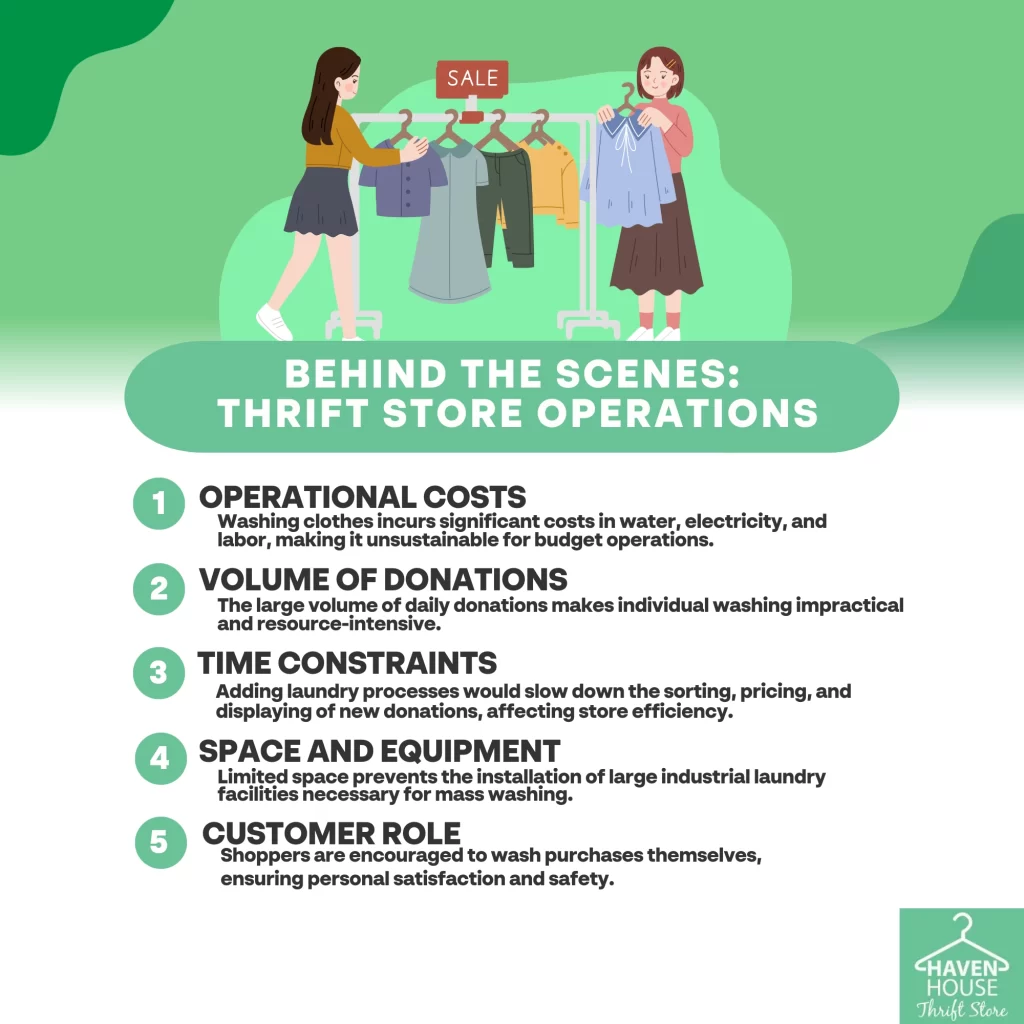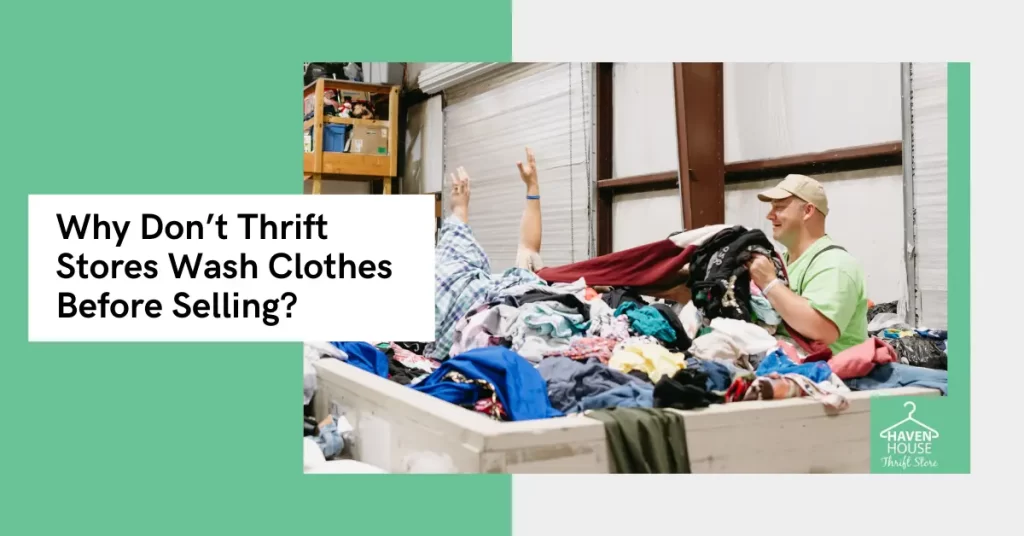Thrift stores don’t wash clothes before selling due to several practical reasons. Washing involves high costs, including water, electricity, and labor, which aren’t sustainable for these budget-friendly stores. The time and resources required to clean thousands of donated items daily would slow down the entire operation. Instead, thrift stores emphasize efficient processing and displaying of inventory. They follow health regulations and inspect donations for damage. As a shopper, you’re encouraged to wash items before wearing to guarantee they’re clean. Want to know more about the ins and outs of thrift store operations?

Key Takeaways
- Washing clothes incurs high operational costs in terms of water, electricity, and labor.
- The volume of donations received daily makes washing all items impractical and time-consuming.
- Limited space and resources prevent thrift stores from installing industrial laundry facilities.
- Thrift stores prioritize quick processing and displaying of items to maintain inventory flow.
- Customers are encouraged to inspect and wash second-hand clothes before wearing them.
Cost Constraints
When shopping at thrift stores, cost constraints are often a primary consideration for many people. You’re likely on the lookout for bargains and affordable prices, which is exactly what a thrift store offers. But have you ever wondered, “What is a thrift store?” Fundamentally, it’s a retail establishment that sells second-hand goods, often donated by the public, at reduced prices. These stores operate on tight budgets to keep prices low for customers.
One major reason thrift stores don’t wash clothes before selling them is the additional cost. Washing and drying thousands of items would require significant resources—water, electricity, detergents, and labor. This would inevitably drive up operational costs, making the items less affordable for budget-conscious shoppers like you.
Moreover, many thrift stores are charitable organizations, relying heavily on volunteers and donations. They aim to provide low-cost goods while supporting various community programs. By avoiding the expense of washing clothes, they can allocate more funds to their charitable missions.
Time Limitations
Have you ever thought about why thrift stores don’t wash clothes before selling them? One major reason is time limitations. Running a thrift store involves numerous tasks that need to be handled efficiently. Sorting, pricing, and displaying items require a lot of time and effort. Adding the task of washing clothes on top of these responsibilities would greatly slow down the process.
When you consider why thrift stores don’t wash clothes before selling, think about the operational impact. Laundering every single garment would require a considerable amount of time. Each item needs to be sorted by fabric type, washed, dried, possibly ironed, and then re-sorted back into inventory. This is a time-intensive process that most thrift stores simply can’t afford.
Moreover, the turnover rate in thrift stores is high. New donations come in daily, and items need to be processed quickly to make space for more inventory. If thrift stores took the time to wash every piece of clothing, it would cause delays in getting items onto the sales floor, potentially leading to a backlog of donations. This time constraint is an essential aspect of why thrift stores emphasize processing and displaying items over washing them.
Volume of Donations
Given the sheer volume of donations thrift stores receive, it’s impractical for them to wash every piece of clothing. You might not realize just how many items come through the doors of what is a thrift store daily. We’re talking about hundreds, if not thousands, of pieces of clothing at any given time. The logistics of cleaning such a massive influx would be overwhelming.
Consider these factors:
- Time Constraints: Sorting through donations already consumes a significant amount of time. Adding washing to the mix would slow down the process considerably.
- Limitations: Thrift stores often run on tight budgets. The cost of water, detergent, and energy to wash all donations would be prohibitive.
- Space Issues: Washing machines and dryers take up space. Most thrift stores simply don’t have the room to install and operate industrial laundry facilities.
- Operational Efficiency: Stores need to get items on the shelves quickly to maintain inventory turnover. Washing clothes would delay this process.
Understanding these practical considerations helps explain why thrift stores emphasize sorting and displaying items over washing them. It’s all about managing resources effectively to keep the store running smoothly.
Health and Safety Regulations
While thrift stores might not wash every piece of donated clothing, they still adhere to strict health and safety regulations to guarantee customer well-being. When you think about what is a thrift store, it’s more than just a place to buy second-hand items; it’s a business that must follow specific guidelines to ascertain all products are safe for resale.
Thrift stores regularly inspect donated items for any signs of damage, contamination, or infestation. They’re trained to identify items that don’t meet safety standards, and those items are discarded or recycled responsibly. Additionally, many thrift stores use sanitizing sprays and other cleaning agents on items that can’t be washed easily, like furniture and accessories.
Moreover, thrift stores must comply with local health department regulations, which often include policies on handling and storing donations. They also abide by fire safety codes and ascertain their premises are clean and well-maintained. Although they might not wash every piece of clothing, these practices help mitigate potential health risks.
Ultimately, thrift stores take several precautions to protect customers, guaranteeing that while the items are pre-owned, they are still safe and suitable for use.
Customer Responsibility
As a customer, it’s crucial to understand your responsibility when purchasing items from thrift stores. Thrift shopping meaning stretches beyond just finding good deals; it involves taking steps to guarantee the items you buy are safe and clean for use.
When you buy clothes from a thrift store, you’re responsible for making certain they’re in good condition before wearing them. Here’s a practical guide to follow:
- Inspect the Items: Check for stains, tears, or any signs of wear. This helps you avoid buying items that aren’t worth your money.
- Wash Thoroughly: Always wash second-hand clothes before wearing them. This removes any potential allergens, bacteria, or odors.
- Check Labels: Look at care labels to understand the best washing methods. Some items might need dry cleaning or special handling.
- Store Properly: Once cleaned, store your thrifted items in a clean, dry place to keep them in good condition.
Conclusion
So, you’ve learned thrift stores don’t wash clothes before selling due to cost constraints, time limitations, and the sheer volume of donations. Health and safety regulations also play a part. Remember, it’s your responsibility to clean those threads before wearing them. Think of it as a small price to pay for finding that groovy vintage jacket. Next time you score a thrifted gem, just give it a good wash and you’re all set!

